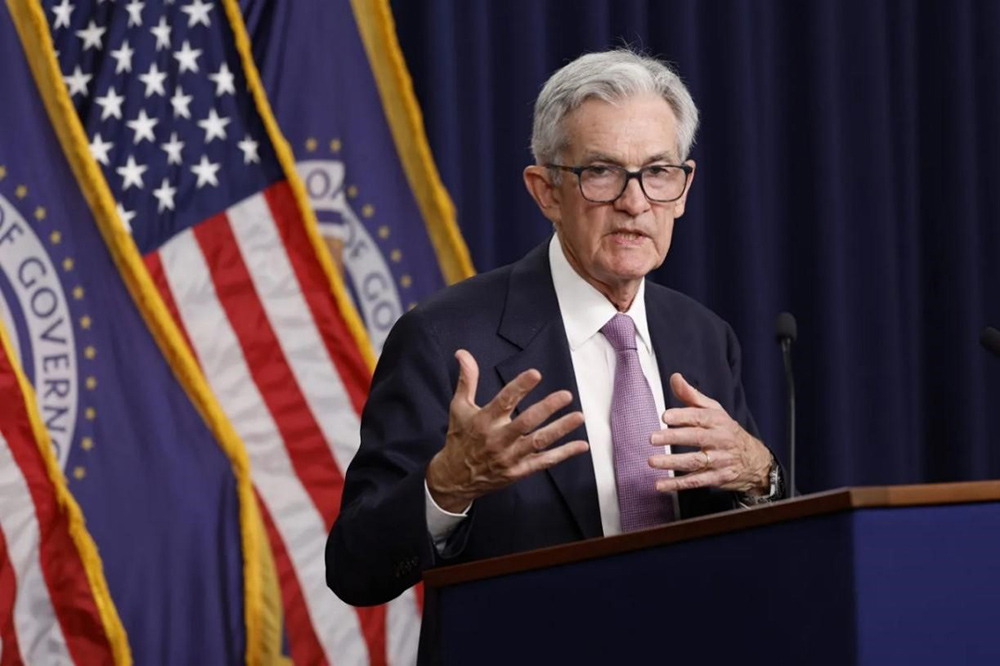
受益于唐納德·特朗普當(dāng)選總統(tǒng)后掀起的史詩(shī)級(jí)市場(chǎng)行情,,美國(guó)第四季度家庭財(cái)富攀升至歷史新高。
美聯(lián)儲(chǔ)(Federal Reserve)上周四的報(bào)告顯示,,美國(guó)家庭凈資產(chǎn)較上季度增長(zhǎng)1,640億美元,,增幅為0.1%,達(dá)到169萬(wàn)億美元,。美國(guó)家庭股票持倉(cāng)價(jià)值增長(zhǎng)近2,640億美元,,但房地產(chǎn)價(jià)值下降抑制了整體漲幅。
持有股票的家庭主要受益于大選后的股市暴漲,,當(dāng)時(shí)投資者大舉押注“特朗普交易”,,期待這位共和黨人在第二任期內(nèi)推行親商政策。
但隨著華爾街擔(dān)憂特朗普政府的關(guān)稅政策會(huì)加劇衰退風(fēng)險(xiǎn),,對(duì)經(jīng)濟(jì)前景的預(yù)期轉(zhuǎn)向悲觀,,近幾周股市的漲勢(shì)已基本逆轉(zhuǎn),抹去5萬(wàn)億美元漲幅,。股市重挫可能導(dǎo)致高收入群體縮減開(kāi)支,,而該群體此前一直是消費(fèi)支出強(qiáng)勁增長(zhǎng)的主力軍。
美聯(lián)儲(chǔ)的報(bào)告顯示,,消費(fèi)者借貸年化增速達(dá)3.1%,,創(chuàng)2023年第二季度以來(lái)的最快增速。非抵押消費(fèi)信貸增速加快至2.6%,,抵押貸款債務(wù)增速則有所放緩,。
未償企業(yè)債務(wù)年化增速放緩至約1%,創(chuàng)一年來(lái)的最低水平,。公共部門方面,,州和地方政府債務(wù)規(guī)模創(chuàng)兩年來(lái)最大降幅。
與此同時(shí),,家庭及非營(yíng)利組織存款(含儲(chǔ)蓄賬戶,、支票賬戶和貨幣市場(chǎng)基金)增加5,780億美元,,達(dá)到創(chuàng)紀(jì)錄的19.4萬(wàn)億美元,創(chuàng)下自2021年以來(lái)的最大增幅,。(財(cái)富中文網(wǎng))
譯者:劉進(jìn)龍
審校:汪皓
受益于唐納德·特朗普當(dāng)選總統(tǒng)后掀起的史詩(shī)級(jí)市場(chǎng)行情,,美國(guó)第四季度家庭財(cái)富攀升至歷史新高。
美聯(lián)儲(chǔ)(Federal Reserve)上周四的報(bào)告顯示,,美國(guó)家庭凈資產(chǎn)較上季度增長(zhǎng)1,640億美元,,增幅為0.1%,達(dá)到169萬(wàn)億美元,。美國(guó)家庭股票持倉(cāng)價(jià)值增長(zhǎng)近2,640億美元,,但房地產(chǎn)價(jià)值下降抑制了整體漲幅。
持有股票的家庭主要受益于大選后的股市暴漲,,當(dāng)時(shí)投資者大舉押注“特朗普交易”,,期待這位共和黨人在第二任期內(nèi)推行親商政策。
但隨著華爾街擔(dān)憂特朗普政府的關(guān)稅政策會(huì)加劇衰退風(fēng)險(xiǎn),,對(duì)經(jīng)濟(jì)前景的預(yù)期轉(zhuǎn)向悲觀,,近幾周股市的漲勢(shì)已基本逆轉(zhuǎn),抹去5萬(wàn)億美元漲幅,。股市重挫可能導(dǎo)致高收入群體縮減開(kāi)支,,而該群體此前一直是消費(fèi)支出強(qiáng)勁增長(zhǎng)的主力軍。
美聯(lián)儲(chǔ)的報(bào)告顯示,,消費(fèi)者借貸年化增速達(dá)3.1%,,創(chuàng)2023年第二季度以來(lái)的最快增速。非抵押消費(fèi)信貸增速加快至2.6%,,抵押貸款債務(wù)增速則有所放緩,。
未償企業(yè)債務(wù)年化增速放緩至約1%,創(chuàng)一年來(lái)的最低水平,。公共部門方面,,州和地方政府債務(wù)規(guī)模創(chuàng)兩年來(lái)最大降幅。
與此同時(shí),,家庭及非營(yíng)利組織存款(含儲(chǔ)蓄賬戶,、支票賬戶和貨幣市場(chǎng)基金)增加5,780億美元,達(dá)到創(chuàng)紀(jì)錄的19.4萬(wàn)億美元,,創(chuàng)下自2021年以來(lái)的最大增幅,。(財(cái)富中文網(wǎng))
譯者:劉進(jìn)龍
審校:汪皓
US household wealth climbed to a fresh record in the fourth quarter as Americans benefited from a historic market rally that followed President Donald Trump’s election.
Household net worth increased $164 billion, or 0.1% from the prior quarter, to $169 trillion, a Federal Reserve report showed Thursday. The value of Americans’ equity holdings rose nearly $264 billion. The overall gain was restrained by a decline in the value of real estate.
Shareholders largely benefited from a post-election surge in stock prices as investors piled into the so-called Trump trade, betting the Republican would enact pro-business policies during his second administration.
However, stocks have mostly reversed course in recent weeks — wiping out $5 trillion in gains — as Wall Street sours on the outlook amid concerns that the Trump administration’s tariffs are raising the odds of a recession. The recent hit to stock portfolios risks causing upper-income Americans, who have largely been responsible for robust consumer-spending growth, to cut back.
The Fed’s report showed that consumers boosted their borrowing at a 3.1% annualized pace, the fastest since the second quarter of 2023. Consumer non-mortgage credit accelerated to a 2.6% pace, while mortgage debt eased.
Business debt outstanding decelerated to about a 1% annualized rate, the slowest pace in a year. In the public sector, state and local government debt shrank by the most in two years.
Meanwhile, deposits held by households and nonprofit organizations, which includes savings and checking accounts and money market funds, rose by $578 billion — the most since 2021, to a record $19.4 trillion.






